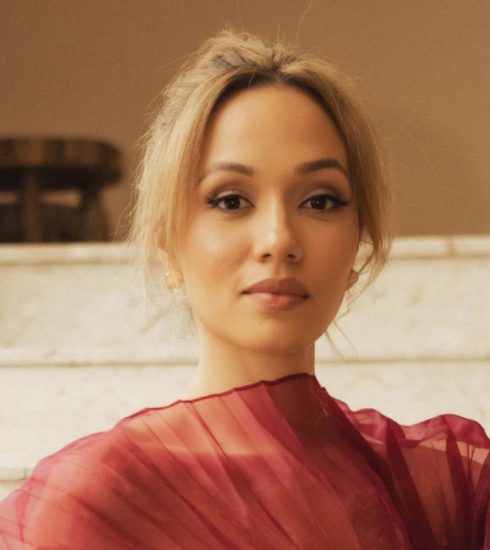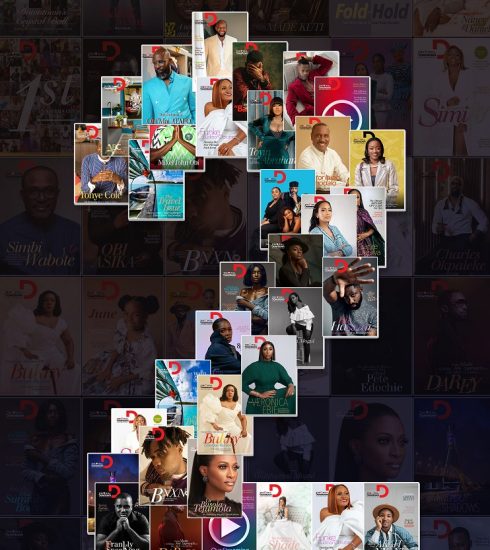Temi Marcella Awogboro On Overcoming Bias Through Grit And Tenacity
The notion that a man can have it all has never been a theme because when you are a man, there are fewer questions asked as you climb through the ladder of life. For women, it’s a completely different ballgame. For so long, it was unclear to society that women could have a successful career as leaders of their respective fields, and—emphasis on ‘and’—be excellent caregivers. Someone who checks all boxes is a leading investment professional and mother of two beautiful girls, Temi Marcella Awogboro.
Temi Awogboro’s illustrious career which started at Goldman Sachs International—where she was selected as a GS Global Leaders Scholar and received the GS Global Leaders Award, spans a range of industries including healthcare, financial services, manufacturing, and information technology. Nowadays, she serves as the Executive Director (Finance, Admin, Strategy) at Evercare Hospital, Lekki.
As we celebrate the women renowned for breaking the bias this month, DOWNTOWN’s writer, Kehindé Fagbule had a conversation with Temi Marcella Awogboro to talk about life as a woman in the corporate world, rising through the ranks amidst the gender-specific barriers, and raising girls that are audacious in their pursuit of a better life.
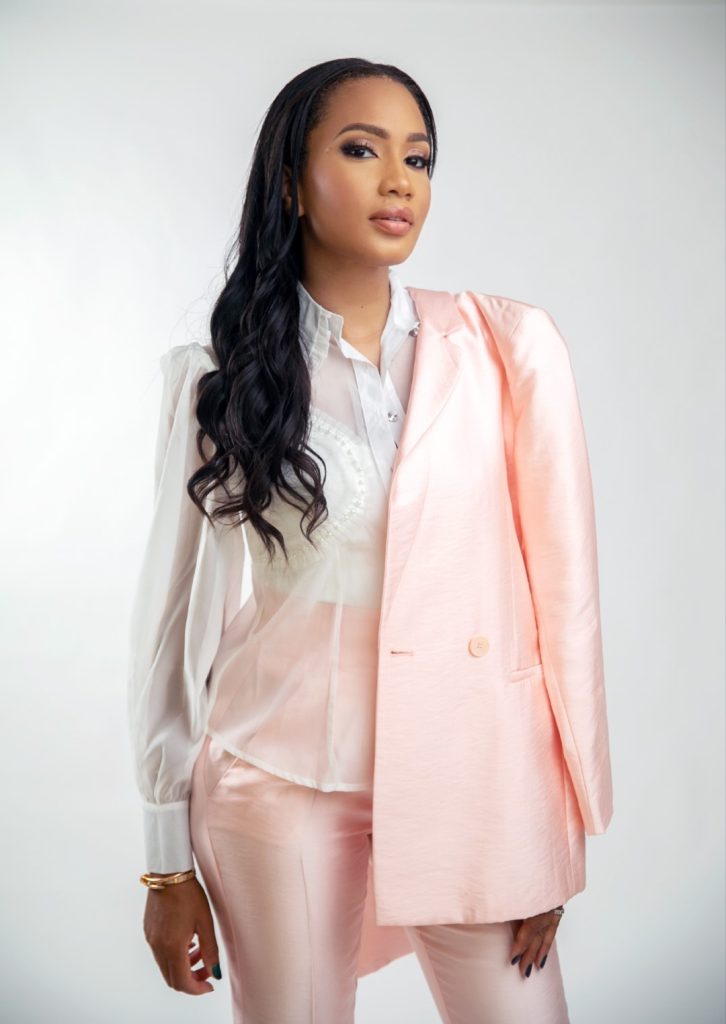
Temi Marcella Awogboro’s obvious wit, which has been evident through her over 10 years of experience, is matched by her stunning beauty. This is quite expected of the daughter of a former beauty queen. Her mother Rita Martins Olatunde, who won the Miss Nigeria pageantry in 1982 is also a tech system engineer at a time when there weren’t many women in engineering.
When asked how important it is to break the biases that dictate that women can’t or shouldn’t aspire to have it all, she replied, “People often ask me and I say, ‘you can have it all but not at the same time.’ I think women put themselves under undue pressure trying to be everything to everyone; you want to be the best wife, mother, employer, employee, and the reality is you have the same 24 hours in the day. So what I have realised is that life is constantly about what you’re prioritising at any given point in time. Where I’ve sort of learnt to juggle it all is to be very intentional about the way that I allocate my time. And to be very clear on what my priorities are at any point in time.
So when I had my children, I was very intentional about taking the time out to have the kids, to make sure that I was set and that was sort of my primary focus; everything else sort of had to take a backseat. At different points in time once they are more independent and once you’ve put the right support system around them, then you’ve created the capacity to then be able to focus on other things. It makes me sad when I see a lot of women of the older generation who clearly had so much potential, but for one reason or the other, due to society’s expectations of them due to cultural limitations, they haven’t been freed from realising their full potential. To me there’s nothing more sad than that because ultimately, your kids grow up, they leave you and go on to live their own lives, everyone is moving on with their lives. So for me, it’s very important that as a woman, you define your identity beyond just raising kids and you create a world where you feel like you are achieving your full potential and it’s the responsibility of your partner, or family, to put together an enabling environment and a support system to enable you to do that.” Awogboro who had stated in the past that she didn’t have any role models, tells what inspires her. She said, “the way I live my life, I try to find inspiration in the form of every interaction I come across.
I’ve always been passionate about entrepreneurship and innovation, and also always seen myself as a stakeholder in them.” Raised in the UK, Awogboro is of German and Scottish descent; she is also well-travelled. She shares her views on the major differences between being a woman in developed countries and back home here in Nigeria. She explains, “the first thing I would say is that Nigerian women are some of the most powerful, strong and enterprising women that I’ve come across.
And now on the surface, it feels like Nigeria continues to be what is a patriarchal society, but we have women breaking through the bias from the public sector to the banking sector where you have a number of women who are now banking CEOs on the boards of large corporations. I would say Nigeria is making a lot of progress on that front, in terms of recognising the importance of diversity and the role that women have to play beyond the home. That being said, because of our cultural leanings and religion, there is still a strong underlying patriarchal overtone that needs to be addressed through institutions that address the gender disparity at the fundamental levels which include access to education for girls. I think there’s a lot of work to be done in terms of addressing those inherent biases that still exist in society, and start from when girls are very young.
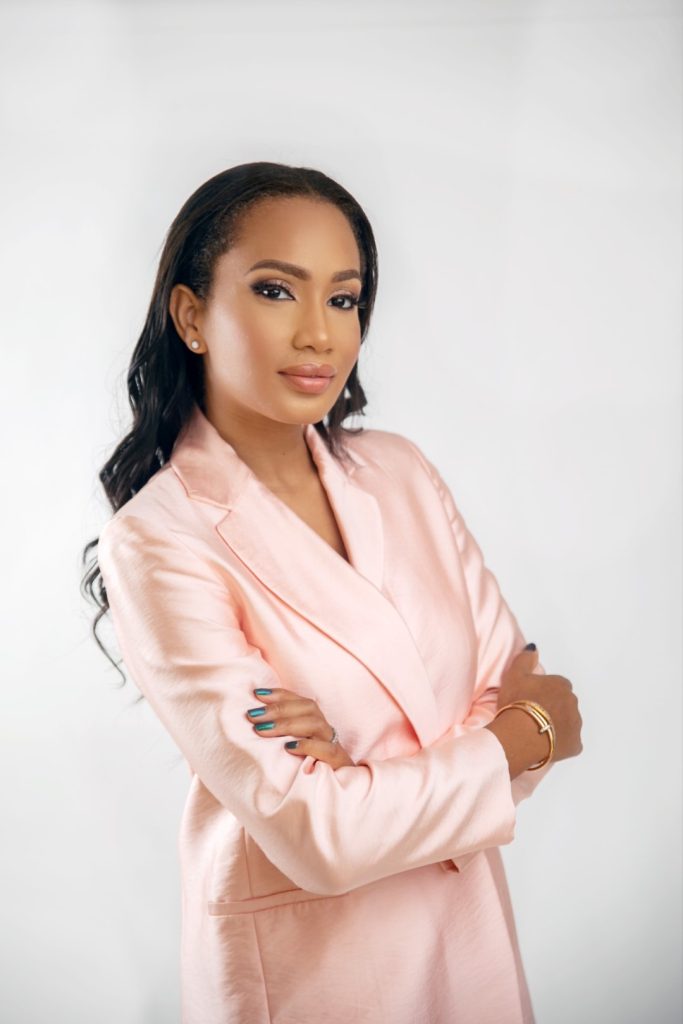
There are a number of initiatives focused on this—women’s empowerment, of course, we are in International Women’s Month and my rule is to continue to be an advocate for gender equality, gender inclusion, and to see the country progress on that front.” Temi started her career overseas, before she was 20 years old, at the multinational investment bank and financial services company, Goldman Sachs. Needless to say, it is a predominantly male-dominated organisation, so she experienced her fair share of bias. When asked what the experience was like for her as a young woman in her first-ever job, and how she handled such situations, she narrated, “Yes, trust me, you don’t forget certain experiences. At the time, it was a male-dominated firm and banking was male-dominated, but the training school was especially dominated by men. There were less than a handful of females on the training team and so it became very clear very quickly that I was in a different world. Things were said, I remember.
Someone had shouted in my direction and one of the training ladies came and took me aside saying, “every time I wear my makeup, I’m wearing my camouflage. Every time you come here, you’re going to war, you have to come prepared. Don’t let them see any emotions.” And I thought ‘Oh goodness me, where am I?’ Because growing up, the things that I think my parents did extremely well is they never really put labels on us, I never really identified myself as a black woman or any other group be it gender, ethnicity, nationality or religion, I always saw myself as just the person, so I was taken aback when I went into the real world and suddenly you’re a woman and there are all these expectations that come with me being a woman. So it was an adjustment for me; I would say that it made me tougher. You see it a lot when you start to overcompensate because you’re very aware now you’re a woman, so I started wearing dark colours only, I was wearing trousers only, I wouldn’t wear dresses, and then I was tough, I was hard as nails, I never showed anyone any emotions. And in a way, that helps you rise up the ranks and succeed. But there’s a certain level of introspection you have when you become a leader and realise that ruling by fear is one way but ultimately, it is probably not the most receptive or sustainable leadership model. The typical strong man model, you know. What is happening in Russia and Ukraine is an example of what the strong man model of leadership does. When you are driven and blinded by ego, and you live in a world it’s zero-sum, that is ‘if I’m going to win, that means you must lose.’ That is not an effective or sustainable leadership model. While I was at Stanford in the Silicon Valley, US, I did a lot of personal work in terms of looking at other leadership styles and I realised that as a woman, there’s so much that you bring to the table that is different, and rather than trying to be like the men in the room, why don’t you embrace the fact that you’re a woman, you stand out, and embrace the things that are unique to you, and you can make them your competitive advantage.
So whether it is not being driven by ego, or being able to manage or be in control of one’s ego, and a natural predisposition to be collaborative, to see life as a win-win as opposed to a zero-sum game, a side that looks to create rather than exploit. There are all these things about the nurturing side of being a woman, and it took me a few years in my career to realise that actually these things are strengths and in terms of where the world is going, we need more of that kind of leadership. So it doesn’t stop at me trying to beat the men at the game that they created, it is about reinventing the game and changing its rules. One that encourages and promotes healthy leadership, one that I believe is more sustainable and better for the world that we live in today. And better for the world I want to create for my children, my girls.”
For Temi, investments come easy — as chronicled in her résumé. The seasoned investor has committed over half a billion dollars in private partnership capital across strategic sectors globally. When asked what it takes to be able to get these investors and how difficult it is as a woman, she replied, “I mean it’s naturally more difficult. When you look at the stats globally, women are vastly underrepresented in the boardroom. According to stats, women do two-thirds of the world’s work and only receive ten per cent of the income and own just one per cent of its means of production. One of the pieces of advice my mentor gave me was to ‘stay close to the money.’ The person who controls the money is ultimately determining how that capital is allocated and influencing the outcome. For me, I’ve always wanted to be in the business of allocating capital. Why? Because if you’re not, you are at the mercy of the decisions of those who have the capital.
In terms of women accessing capital, it is harder because there are very real biases that exist in the world and from an investment perspective, the whole essence of it comes down to trust. ‘Do I trust the person that is going to be the custodian of this money?’ And it is scientifically proven that people tend to trust people who look exactly like them more than they do people who don’t. Even if they are not trying to do it consciously, it’s a subconscious bias.
So in order to be able to address that, I’ve always felt that we need more women capital in business because they will be in a position to ensure that they allocate, deploy and mobilise capital behind women and issues that affect women disproportionately. That was actually the whole reason why I decided that I wanted to go down the role of being an investor. Gender is something that I’m focused on in my career and my leadership journey. So yes, I will say it is harder for a number of reasons. Subconscious biases, societal expectations of women, investors will look at you and think ‘if I give her my money, will she be able to hustle and get returns or will she take a break and go and have kids? These are all sorts of things that come into people’s minds and fairly put women on the back foot.”
To give us a sneak peek into how she managed to gain their trust, she narrated, “for me, what has kept me going over the years is a very clear sense of purpose, an unrelenting tenacity and unwavering belief in myself. So even when you walk into a room and it’s clear that you are the only woman in the room and feel they don’t trust you or they’re not really your allies and they’re questioning why you’re in the room, that self-belief in terms of ‘I deserve to be here, I demand my seat at the table’ has always been very important to me. The second thing is I’ve always been focused on delivering results.
For me it’s always been ‘my track record will ultimately speak for itself,’ so you’ll have no choice but to trust and want to align. You know they say sometimes you have to work twice as hard to prove yourself. I remember when I was in a private firm and the guy looked at me and said, “look, you are going to be a distraction in our office. Have you ever considered a career in fashion, this is a really hard job?” This is someone who came out with a first-class from Cambridge, worked in Goldman Sachs, went to Stanford University, has done more than half of the people that walk through this door and you’re telling me it’s a hard job and I should go to fashion. I just thought I’m not going to internalise this and allow it to cause doubts in myself, this is clearly your own issue, and so I laughed it off. I could do that because I put in the time and the work to get the result. So honestly it’s a combination of self-belief, staying true to purpose. For me, I have my three P’s that I follow; purpose, passion and performance. You need those three. The purpose is asking the question “why am I even doing this? Why does it matter?” Then the passion, “am I passionate about this? Is my heart in it?” and finally the performance, “what are the results?” You need all three to be successful. When one is out of balance, it’s a red flag for me, so I have to think Because of how gorgeous she is, one would reckon that there are instances when people would profile her as notso- smart, as men often do. When asked if there are times that she wasn’t taken seriously just because of her beauty, she replied, “Hundred per cent, a lot of times.
I experienced it more in Nigeria than I did in other parts of the world, which was surprising to me. There are times that I would go for board meetings and they would be commenting on my looks. ‘Do I have a twin? Can I bring her to the next board meeting? The chairman of one of the boards asked me to come and sit on his lap while we were taking pictures for the annual review. For me, that was very traumatic, I mean this was within my first year of moving to Nigeria. So I stopped wearing makeup and dresses, I only wore black, I still predominantly wear black, because I wanted to walk in a room and be taken seriously, so I did that for a couple of years because it was clear that I was a distraction in certain ways and it was highly frustrating because I wanted to be taken seriously. I had to do a lot of staff work to realise that the issue wasn’t me, it wasn’t anything I was doing that was causing this. It was that people have been conditioned to believe that you can’t be beautiful and take care of yourself and be smart and successful. The world wants to put you in a box and when you don’t fit in that box, it causes agitation for people. But I’ve lived my life not wanting to fit in a box, not wanting to live up to anyone’s expectations or labels of me. My nickname growing up was ‘small but mighty’ and that was really the one identity that came with me because yes, you can be small and do all these amazing and impactful things in the world and there’s nothing like ‘too small’.
The first thing I did was develop a sense of humour. I found the ability to not internalise it but to laugh about these things. And to realise again that it wasn’t my issue, it was their issue. Also, I doubled down my efforts on grooming myself. I always say that success in business doesn’t come from the smartest person in the room, it actually comes from grit and tenacity. Can you keep getting up no matter how many times you get knocked down? I’ve been at the centre in terms of my career. I started my career less than one month before Leemans dropped and we went into a global financial crisis. I had to commission a hospital in the middle of a global healthcare pandemic. For me, it’s not been easy but the one thing I’ll say is that I persisted and I have grit and tenacity, and so I will keep fighting through. That fighting spirit and that focus on being result-oriented helped in terms of my career in Nigeria because I was able to build a reputation that was based not on my physical appearance but the impact that I’ve had in people’s lives and the results I have achieved.”
This wouldn’t stop Awogboro however. Seven years ago, she committed as a private equity investor that would bring a world-class hospital to Nigeria. March 11th last year, a 165-bed, purpose-built, multispecialty tertiary care hospital, Evercare was commissioned in Lekki, Nigeria. Awogboro was at the forefront of that. When asked why she chose healthcare and more so in Nigeria, she said, “My father is a doctor although he stopped practising a long time ago. My siblings and I spent our entire lives running away from medicine. So when they asked me to head the deployment of a health facility, I resisted because I don’t like hospitals [laughs]. So the thought of running a hospital wasn’t something that was at the forefront of my mind. But when I came to Nigeria and I started visiting hospitals, I heard stories of avoidable deaths that were a result of lack of equipment, consumables or poor infrastructure. It just became clear that I couldn’t turn a blind eye to the need. I had always said I’m an impact investor, but what is the biggest impact you can make on people? I couldn’t see any bigger impact I could make on people and the country than at least playing some part in solving the healthcare issue. For me, access to care is a fundamental human right and I don’t think you can call yourself a country if the majority of your citizens don’t have access to healthcare. So it became a mission for me actually. I didn’t expect it, nor was it planned, but it became a personal mission that I was privileged and blessed to be working as a part of an organisation where we were able to pull a group of investors together who also had the same vision and we collectively said we were going to do this at all cost even when we ran into challenges, even when the global pandemic hit, the focus was just that we need to open those doors. There’s nothing like failed projects, failure is not an option. Fast-forward, it’s been the most important impactful thing that I’ve done in my professional career. As you know building or running anything in Nigeria is hard work and it comes with its challenges but when you get it right, there’s nothing more rewarding than saving lives or even just allowing someone to move on in dignity and peace. Evercare is off to the races and it’s doing what it’s set out to do, which was to transform healthcare. It comes with its challenges, but with every challenge, it forces us to be better, do better, find solutions, so we can actually live up to that desire to bring quality care to as many people as we can.”
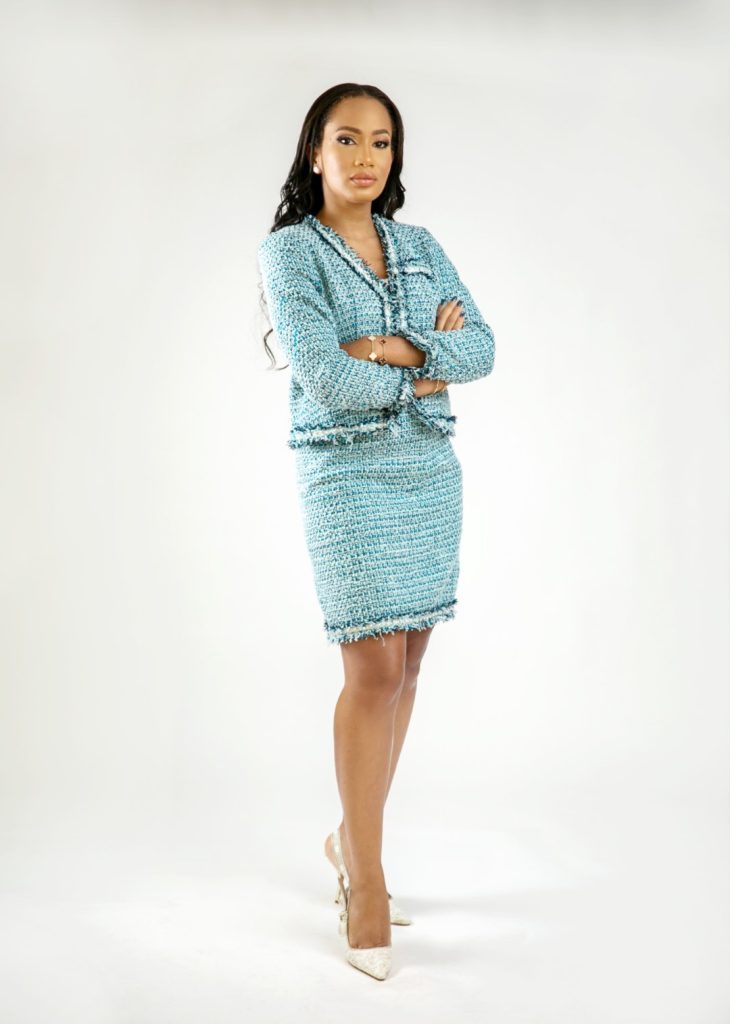
Her tremendous job at her role as the Executive Director of the hospital would then earn her a seat on the Nigerian Health Sector Reform Committee within the same year. When asked to explain her roles as a member of the committee, she narrated, “I’ve always been a big believer in private sectors and private sector-led initiatives. What also became very clear to me is that the private sector doesn’t operate within a vacuum and cannot innovate its way out of bad policies, and the public sector has a real role to play in creating an enabling environment. So that led me down the path of ‘how do we ensure collaboration between the private and public sector?’ and that’s why this role on the health reform committee was so important for me because at least I wanted to be able to provide my insights and learnings from the private sector to be able to influence and inquire the public sector agenda on healthcare in the country.
And it’s a great initiative of the government to actually take it seriously and put it at the top of the agenda because they’ve also recognised as a result of the pandemic that healthcare is of strategic importance to a nation. The populace is very vulnerable if you don’t have a proper healthcare system. You can’t rely on importing talent, grants, consumables and equipment because when the global pandemic hit, everyone started focusing on their own.”
As aforementioned, Awogboro isn’t just into healthcare. The serial entrepreneur is also a co-founder at Kairos Angels and a partner at Magic Fund. She talked about her other projects, “I have always been passionate about entrepreneurship and innovation. My parents are both entrepreneurs actually, so it’s all I know quite frankly. And then there was being in Silicon Valley in what was the pioneering tech echo system. I’ve always wanted to be in a position where I can support the innovation and contribute, and so that led me to co-found Kairos and also join Magic.”
Her leadership skill, as she discussed earlier, is one of her strongest traits. Awogboro has been an Archbishop Desmond Tutu fellow since 2018. When asked to shed more light on what the fellowship entails, she replied, “the essence of the fellowship really is about leadership on the continent. Tutu’s fellowship is about responsible leadership that recognises the importance of taking decisions that are ultimately sustainable, of taking into account stakeholders and decision-making. I think it’s been a great programme, it’s been an opportunity to bring leaders from countries around the continent because all too often we operate in silence. I see the Tutu fellowship as a great springboard for that and we are very close as a collective.
Obviously the passing of Desmond Tutu last year was a big loss, not just for Africa but for the world because, in some way, he was an example of that responsible leadership that we talked about. But at the same time, his legacy lives on and we continue to strive to keep Africa on the agenda, move the continent forward, and enable us to live up to its full potential.” In a world that is not exactly designed for women to thrive, leadership is not an easy task. When asked what fuels her drive, she replied, “at different points in my life, it was different things. I would say today, I’m a mother of two girls and I’m very conscious of creating a world where they don’t have to go through certain things that I went through, and where they can walk into a room and be judged not just by their physical attributes but by the content of their character, their results, their mind and all sorts of things. A world where they are not fighting against stereotypes. Also, I’ve always been an advocate of the underdog, I’ve always seen myself as someone who is fighting for the underrepresented, those who don’t have a voice, to make sure that they are given a voice and they are heard, and their needs and desires are taken into account in leadership and decision-making. I think we’re at a unique point in history where technology is changing the world we live in so quickly and is forming the way everything is done and works. We have an opportunity to be stakeholders in that and to shape technology in a way that is beneficial for the majority and not just the minority. Those are the things that drive me today.”
Built for a movie screen, the question of if Awogboro would ever consider being in front of a camera came up, just like another seasoned businesswoman, former First Bank of Nigeria Chairman, Ibukun Awosika, who made a cameo appearance in Kunle Afolayan’s critically acclaimed film, Citation. It could be seen on Instagram that actress Omoni Oboli once joked about casting her in a movie. So naturally, the question of whether she would consider being in a movie came up, and this is what she had to say, “I never say no to things, especially when there’s an opportunity to reach an audience with an important message. It’s just another potential platform, so yeah, maybe. Watch this space [laughs].”
Awogboro’s style is very aesthetically appealing. She can be very formal and also quite casual but one thing stays the same; very stylish. When asked how she balances her formal and casual style, she replied, “prior to being a mum, I would say my style is a lot more formal and businessready and maybe this is because I was trying to project the image of someone serious. And I think one of the things I took from becoming a mum is you watch kids play, the way they live and embrace life, how they don’t take themselves too seriously. Because of these situations that I found myself in with my life and my career, I have become very serious, I had lost that thirst for life, that enjoyment and just being free. So that sort of changed the mindset along with developing a sense of humour, and I guess fused into my passion.

More recently I’m daring with colours. For example, before I’d choose either black or neutral, whereas now I can wear greens and pinks. I wear a lot of pinks. I used to stay away from pink because I used to think people would think I was a real airhead if I came in a pink suit. But now I do, I love it. For me, it’s just embracing all parts of your personality and one thing doesn’t take from the other. You can be professional and successful and ambitious and audacious, but also be fashionable and fun-loving and free, and my goal in life is to live the best version of me and embrace all aspects of me. And showcase that to liberate other people to do the same. And you don’t have to live someone else’s version of you, you can be free to be you and there’s beauty in that.”
Awogboro currently raises two beautiful girls. When asked to share some parenting tips she might have for women especially looking to raise girls who break the bias just like her mum did with her, she closed the interview saying, “One of the things that were said pretty recently that struck me was when Kamala Harris was elected as the Vice President of the US and in her victory speech, she essentially said, “dream with ambition, lead with conviction and see yourself in a way that others might not see you simply because they’ve never seen it before.” And that really struck a chord with me because that was essentially my life. I’ve always dreamt with ambition, I’ve always had this sense of conviction, but people hadn’t seen it before so they didn’t know what to do with it, and I didn’t know what to do with it. But you get to a point in your life where you’re like “this is me” and I’m comfortable with who I am, I am comfortable in my skin and in my ambition and I’m not going to be a lesser version of myself to make others comfortable. So for me, that’s really the key piece of advice for raising children, especially girls. It’s really about encouraging them to be bold and audacious in the dreams that they have. To have a sense of self-belief, conviction and audacity to go out and demand what they want in the world, and to go for it and not be afraid of failure because failure is a part of the process and journey. Also to embrace who they are and the world will ultimately accept them.
I love the theme, breaking the bias, because there are so many biases that exist at home, in the workplace, in society, in relation to how women are seen and the expectations of women. And I feel like I’ve spent my life being a rebel and rebelling against those biases and that status quo and I’ve had to pay for it in many ways, but also I’ve been liberated from it. I just want to be able to inspire girls and women out there to really go for their dreams and be unapologetic about it. You deserve it, it’s yours.”
Self-identifies as a middle child between millennials and the gen Z, began writing as a 14 year-old. Born and raised in Lagos where he would go on to obtain a degree in the University of Lagos, he mainly draws inspiration from societal issues and the ills within. His "live and let live" mantra shapes his thought process as he writes about lifestyle from a place of empathy and emotional intelligence. When he is not writing, he is very invested in football and sociopolitical commentary on social media.






